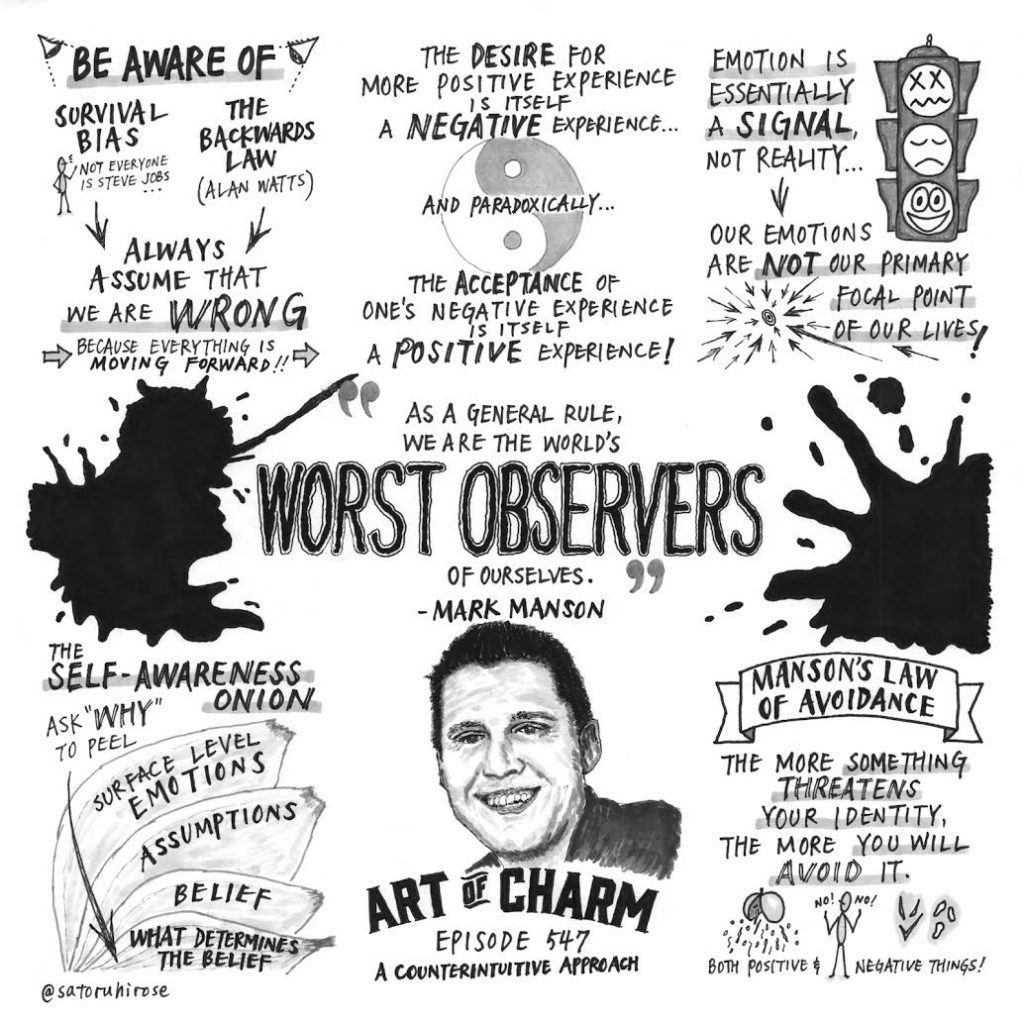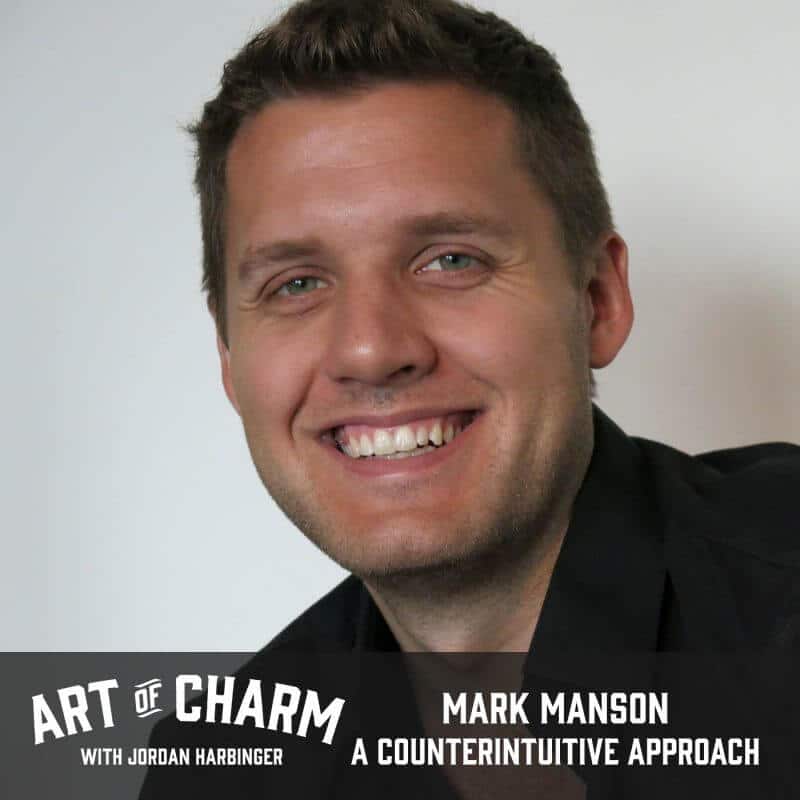Mark Manson (@IAmMarkManson) returns to the show to talk about his new book The Subtle Art of Not Giving a F*ck: A Counterintuitive Approach to Living a Good Life — available today! F-bomb alert level: juicy orange.
The Cheat Sheet:
- Conventional life advice — all that positive, happy, self-help stuff we hear all the time — is actually fixating on what you lack and making you unhappy.
- Always assume you’re wrong: if you’re embarrassed about things you held to be true and dear 10 years ago, it stands to reason that things you hold true and dear today will be embarrassing 10 years from now.
- What The Feedback Loop from Hell is — and why it’s making you miserable.
- How you can use The Backwards Law to get out of the vicious cycle of comparing yourself to others.
- How The Self-Awareness Onion can lead you to a great understanding of yourself and your relationships.
- And so much more…
[aoc-subscribe]
According to Mark Manson, author of The Subtle Art of Not Giving a F*ck: A Counterintuitive Approach to Living a Good Life, giving too many f*cks is bad for your mental health. It causes you to become overly attached to the superficial and fake, and to dedicate your life to chasing a mirage of happiness and satisfaction. The key to a good life is not giving a f*ck about more; it’s giving a f*ck about less — giving a f*ck about only what is true and immediate and important.
Mark returns to the show (catch his last appearance here) to talk about why the solution to most of our problems is not in avoiding negative experiences, but in acceptance and active engagement of them. If you want to feel better about not feeling good enough, you won’t want to miss this episode. Enjoy!

More About This Show
“For every Steve Jobs or Michael Phelps, there’s thousands and thousands of people who worked just as hard, made the exact same sacrifices, and just came up short or didn’t make it,” says Mark Manson, author of The Subtle Art of Not Giving a F*ck: A Counterintuitive Approach to Living a Good Life. “A lot of times, we’re so attached to that narrative of ‘This guy believed he could be the best and he worked hard and he made it’ that we don’t account for the role of chance in life — being in the right place at the right time, or simple, small decisions that you got right and it has this butterfly effect that spreads down to everything you do.
“It’s not a pleasant thing to think about. ‘Oh, I could work my ass off and do everything right for the next 10 years and not be the next Mark Zuckerberg.’ People don’t like to hear that, but that is actually a realistic view of how things work.”
Even people who are successful can’t always give you the winning formula that worked for them, because they’re not always aware of all of the factors that conspired in their favor. In the process of trying to dispense the wisdom of winning, it’s easy to default to platitudes like “work hard.” As hindsight is 20/20, we often miss entire parts of the equation — and it’s frustrating because we think we’re following a tried-and-true path. What we forget is that it’s someone else’s path.
So how can we identify a path that will work for us? Instead of following our natural human tendency to fall into patterns we believe are right, Mark believes we need to approach it from the opposite perspective. “We should come at it from the other angle — an intensely skeptical angle. Always assume that you’re wrong from a purely philosophical point of view. We are always wrong about whatever we believe. Knowledge is always moving forward, and if you think about things you used to believe 10 years ago or five years ago, it embarrasses you now. And the things that you hold dear and hold to be true today are likely going to embarrass you in 10 or 20 years from now. So if we use that as our starting point, we can…decide that all of our assumptions are flawed in some way and then start asking ourselves, ‘Well, if I am wrong about this, what does that mean?””
Striving to improve ourselves and seek out a better future is natural. But happiness is an elusive concept — and one that is often sabotaged in the act of searching for it in the first place. “If you’re constantly having to read books that tell you how to be happy,” says Mark, “you’re unconsciously reinforcing the idea you’re not already happy.” It’s easy to fall into a trap of comparing and contrasting our own experiences with the stories of people who sought and eventually found happiness. But again, we often unconsciously try to duplicate someone else’s path and wind up on a journey that takes us far from our intended destination.
Another obstacle to happiness is what Mark identifies as The Feedback Loop from Hell. “It’s basically this idea that people often judge their own negative emotions. So if you feel socially anxious at a party and then, because you feel anxious, you identify that anxiety. And because you feel anxious, you start telling yourself, ‘Wow, I’m such a loser for being so anxious; I can’t even come to this party and talk to somebody.’ That makes you feel even more anxious — now you’re feeling anxious about feeling anxious! And it just starts compounding upon itself.”
This feedback loop can also perpetuate and magnify anger, guilt, regret, or any number of negative emotions — and these days, this feedback loop is especially exacerbated by online social media. People tend to post about exceptional events from their lives and leave out the mundane, which creates a sense in observers that everybody else is having an amazing time — all the time — and there must be something wrong with them if they’re not also having a nonstop cavalcade of excitement.
One of Mark’s big goals with his new book is to remind people that it’s okay to feel bad sometimes. “Negativity needs to be okay in our culture again,” he says; “otherwise, we’re just going to keep perpetuating all this anxiety and neuroticism that’s growing.”
Listen to this episode of The Art of Charm in its entirety to learn more about how every technological advancement always brings with it a period of cultural adjustment, why the acceptance of one’s negative experience is — itself — a positive experience (and vice versa), the place of pain in our human hard wiring, why we should still seek to improve ourselves even if this counterintuitive approach seems to indicate otherwise, why comparing our progress by the yardstick of others’ success is a surefire way to experience perpetual unfulfillment, how to tell a good yardstick from a bad yardstick, what we should give a f*ck about, how to successfully question our emotions so they don’t cloud our judgment, the problems with the self-esteem movement, what Mark means by victimhood chic, how The Self-Awareness Onion can help us better understand ourselves and our relationships, what Manson’s Law of Avoidance constitutes, why we shouldn’t believe any of our problems are truly unique (and why this frees us up to talk about them with others), and lots more.
Resources from this episode:
- The Subtle Art of Not Giving a F*ck: A Counterintuitive Approach to Living a Good Life by Mark Manson
- Episode 454: Unconditional Communication (Mark’s last time on the show)
- Mark Manson’s website
- F&$% Yes or No
- Mark Manson at Facebook
- Mark Manson at Twitter
- Kimberly Seltzer | How to Find a Therapist (Bonus)
You’ll also like:
- The Art of Charm Challenge (click here or text 38470 in the US)
- The Art of Charm Bootcamps
- Best of The Art of Charm Podcast
- The Art of Charm Toolbox
- The Art of Charm Toolbox for Women
On your phone? Click here to write us a well-deserved iTunes review and help us outrank the riffraff!




